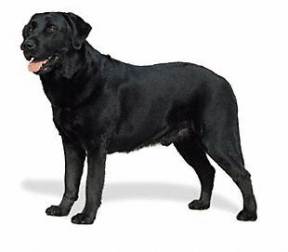Height: 21.5-24.5 inches
Weight: 55-75 lbs.
Life Span: 10-12 yrs.
Breed Group: Sporting Dogs
Overview
Labrador retrievers are among the most appealing dogs. They are very trainable,
always ready to work and to please their owners.
They are also kind, outgoing, intelligent, adaptable, and friendly to humans
and to other animals. They love children and want to be involved in all
of their activities.
The Labrador excels in field trials, as a service dog, and in narcotics
detection.
Appearance
The outercoat is short, straight, and very dense; the undercoat is soft
and weather-resistant. Coat color is black, yellow, or chocolate, sometimes
with a small white spot on the chest.
The tail is otterlike, thick at the base, tapering gradually to the tip.
Grooming & Exercise Needs
Labrador retrievers need to be brushed one to two times a week.
They need a lot of exercise--daily vigorous walks and an opportunity, preferably
daily, to romp and retrieve balls in a secured open area.
They love water and, in all fairness, should be taken to swim and retrieve
in a safe area on a regular basis.
Field stock is generally much higher in energy than show stock.
Origins
The Labrador retriever originated in the 19th century in Newfoundland (not
Labrador), where it was used by fishermen to pull in fish-filled nets by
retrieving the attached cork floats.
Special Alerts
It is especially important to obtain a Labrador retriever from a reputable
breeder. Breed-related health concerns: hip dysplasia, osteochondritis
dissecans, hypothyroidism, progressive retinal atrophy, cataracts, epilepsy.
Reference: AKC - American Kennel Club |

